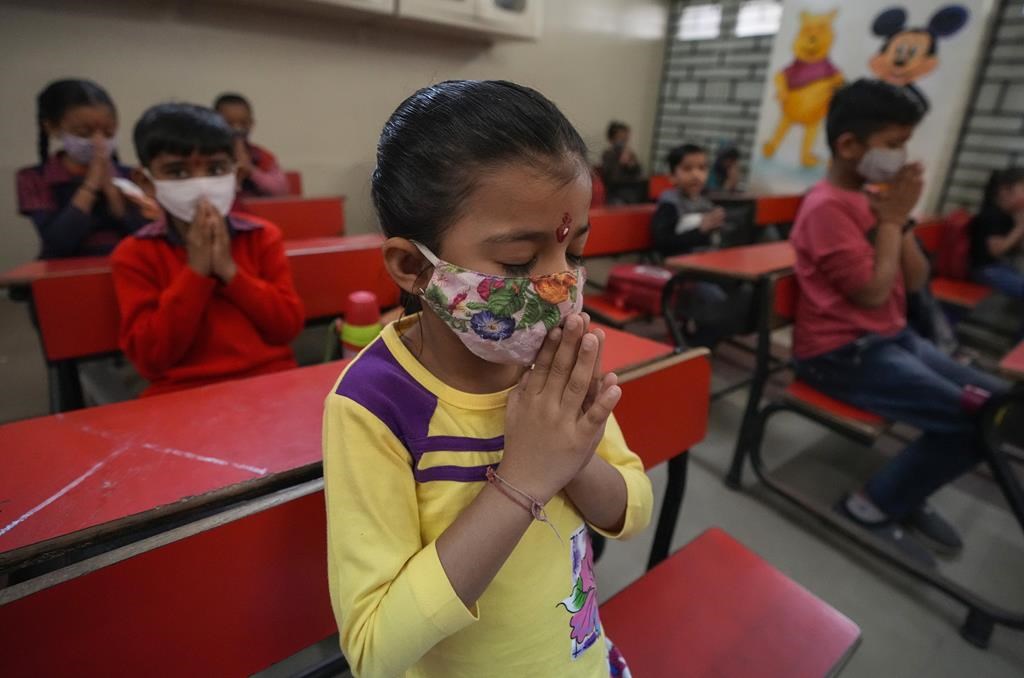TORONTO — For the first time in about a year and a half, Ontarians can shop, watch a movie and attend a hockey game without wearing a mask, as the government lifted the requirement Monday in most public places.
Public school students were also able to go to their classes without wearing a mask, although many chose to continue to wear it.
Mask wearing remains mandatory in Ontario, through the end of April, in health care facilities, public transportation, long-term care, retirement homes and other congregational care settings. But masks are no longer required in most other public places, including restaurants, bars, gyms, businesses, cinemas, theaters, concert halls, sports venues and any gathering place.
Businesses can individually decide to require the wearing of a mask or even proof of vaccination for their customers – the Ontario passport was abandoned on March 1.
Other health measures in schools, such as “class bubbles” and daily on-site screening for symptoms, also ended Monday in Ontario.
Some school boards have asked the government for permission to keep masks mandatory in schools for a little longer. They called for low vaccination rates among children aged five to 11 and the need to prevent an outbreak of COVID-19 when spring break returned on Monday.
But Chief Medical Officer Dr. Kieran Moore reminded them last week that school boards must follow regional guidelines.
However, the Hamilton Wentworth School Board has indicated that it intends to maintain the wearing of masks in its schools until April 1 – ten days after returning from spring break.
The mask at school in N.-S.
Nova Scotia is also removing requirements to wear masks in most public places, but not in schools.
The government had first indicated that a mask would no longer be mandatory on Mondays in public schools. But last Friday, Dr. Robert Strang, chief medical officer, indicated that some students may have been exposed to the coronavirus during spring break.
The Premier of Nova Scotia, Tim Houston, also explained that this decision was made on the advice of a pediatric advisory group that has researched throughout the pandemic on health measures for schools.
Premier Houston also made clear last week that mask-wearing will remain mandatory in other settings such as hospitals, long-term care homes and prisons.
Nova Scotia entered phase three of the province’s reopening plan on Monday. Restrictions such as grouping, spacing and mask wearing limits have now been lifted. But some companies have decided to play it safe.
Amy McIsack, owner of a Halifax-area bookstore, said she and her crew will continue to wear the mask, but that customers will have a choice. “We have a lot of elderly clients and many of them have health issues (…) we thought it would be wiser,” said the owner of Dartmouth Book Exchange.
The Neptune Theater in Halifax has also decided to maintain sanitary procedures. The theater will offer low-capacity shows and will require proof of vaccination, distancing, and wearing a mask during the show.
“Our customers have expressed caution about returning to the gathering at the theater,” Neptune general manager Lisa Bogden said Monday. “We did our shows at low capacity because we knew some members of the audience weren’t comfortable even with the idea of sharing an armrest.”
Nova Scotia residents also expressed conflicting opinions on Monday about the facilities provided for in Phase 3 of the general dismantling.
The head of Public Health Canada, Dr. Theresa Tam, continues to encourage the wearing of masks in public, given the possibility of an increase in infections, as seen in many countries in Europe and Asia due to the presence of the Omicron Library. sub variant.
However, Dr Tamm encourages the high rate of vaccination in Canada, noting that countries with lower rates have more deaths.
In New Brunswick, the chief medical officer for health, Dr. Jennifer Russell, still strongly encourages the wearing of masks, especially for the most vulnerable, even though the measure was lifted a week ago in that province.
–
This submission was produced in part with financial support from the Facebook Fellowships and The Canadian Press for News.

“Total creator. Evil zombie fan. Food evangelist. Alcohol practitioner. Web aficionado. Passionate beer advocate.”

